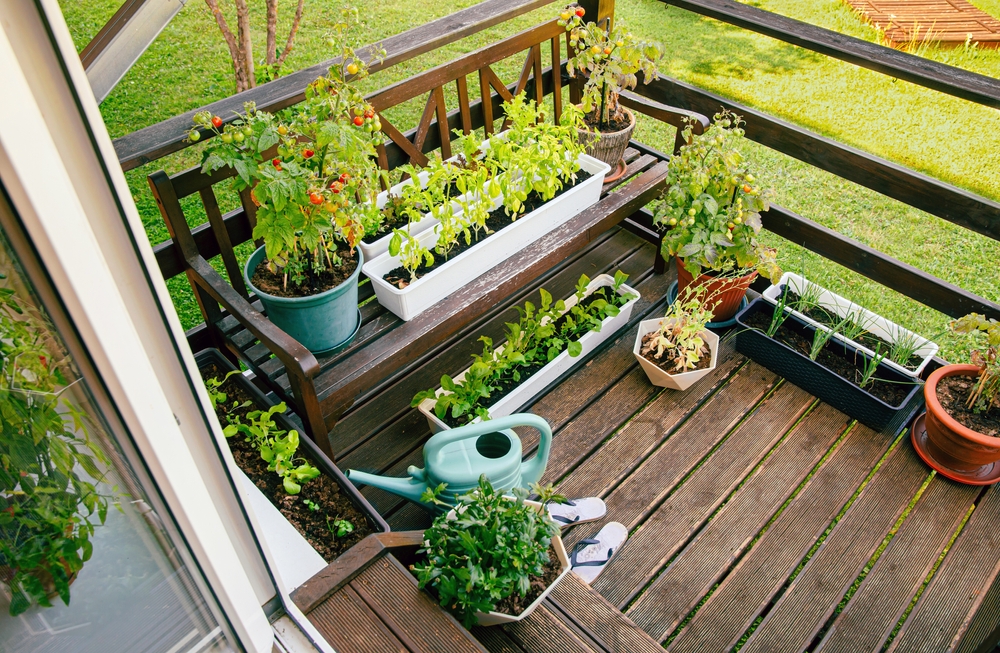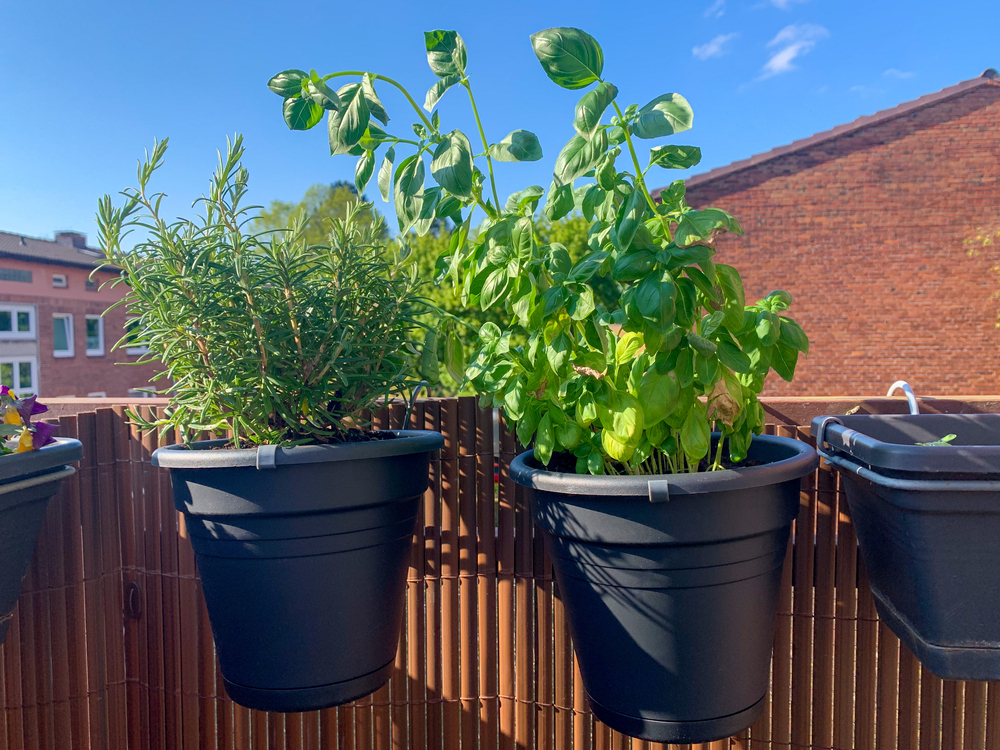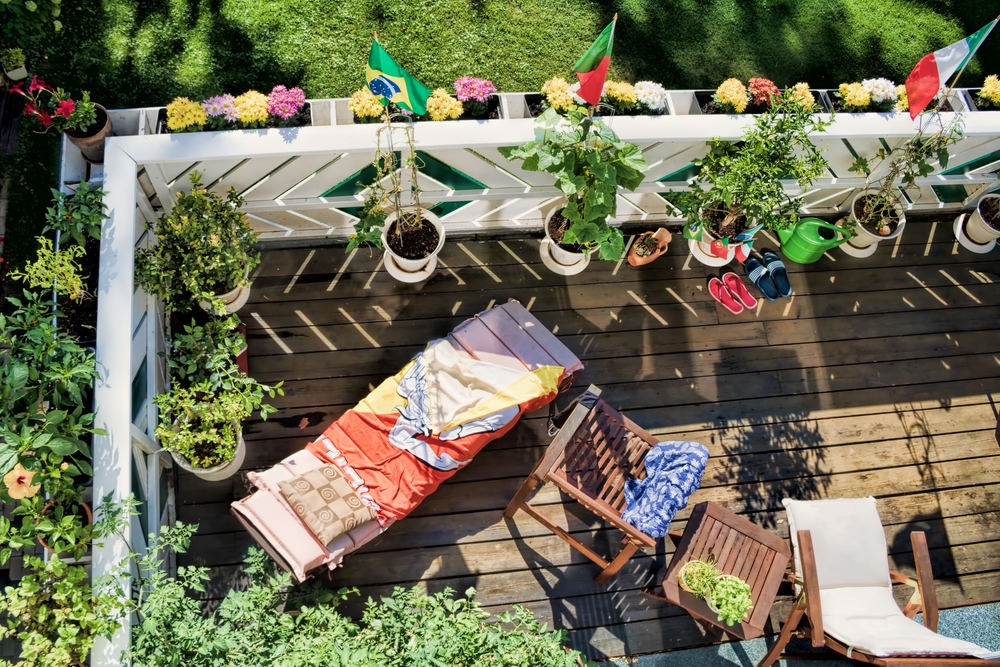Growing herbs on a balcony is incredibly easy. Most herbs require little attention, grow quickly, and stay alive all year.
In this article, we’ll look at how to start an herb garden on your balcony. We’ll cover supplies, placement, and the best choices for you to get started.
Why Grow a Balcony Herb Garden?

The most obvious reason for growing herbs on a balcony is so you have a constant fresh supply for your cooking. The difference between fresh and dried herbs is incredible, and having them on hand makes a big difference.
Also, an apartment balcony herb garden doesn’t take up much space. This makes it a good growing project for those with small balconies.
Considerations Before Growing Herbs on Your Balcony
There isn’t a ton that you need to consider before starting a herb garden. The most important things are:
Balcony Position
Most herbs enjoy full or partial sunlight, so any balcony facing a southerly direction is ideal. If your balcony faces a northerly direction, just go for herbs that enjoy partial shade (more on this below).
Weather
You can grow herbs in pretty much all climates. Hardy ones, such as mint and rosemary, can withstand snow, but it’s always a good idea to bring them indoors in the winter.
Fragile herbs (basil, dill, sage) can’t tolerate temperatures below 70F. Your best bet is to work out your USDA Hardiness Zone and check it on an herb’s growing instructions.
Space
You don’t need much space to grow herbs. Some (rosemary) get really big, but are happy to be pot-bound in smaller containers. If you’re really short on space, you can even grow herbs in soda bottles.
Best Herbs for a Balcony Garden
The herbs you pick for your balcony herb garden should be based on what you’ll actually use. Basil, oregano, rosemary and mint are common in recipes, but it ultimately depends on what you’ll use.
The following are good choices for an apartment balcony herb garden because they’re easy to care for and don’t need much space.
- Mint (also repels bugs) – 55-70F
- Lemon balm (also repels bugs) – 55-70F
- Rosemary – 55-70F
- Basil – 65-85F
- Oregano – 55-75F
- Cilantro – 60-70F
- Bay leaf – 50-70F
- Chives – 60-75F
- Sage – 70-85F
The temperatures are just recommendations. You can keep rosemary outside during the winter and it’ll just go dormant. Something like basil, though, will quickly die.
If you’re concerned about your herb garden thriving, simply bring it indoors over the winter.
But, don’t get complacent in the summer, either. Even a warm-loving herb like basil will scorch in intense summer sun. Always check an herb’s specific growing instructions to ensure you have the right environment.
Best Balcony Herb Planters

You can grow herbs in any container that has drainage. For larger herbs like rosemary and mint, use floor planters. But, for smaller herbs, you can use a balcony herb planter on your railings.
Alternatively, you can build an effective vertical herb garden using anything from wall boxes and fabric shoe racks to a custom DIY option.
Check out our article on balcony railing planters for more specific information.
Herb growing instructions will always suggest an ideal pot size. Use this as a guide, though, as most herbs are happy being pot-bound. Opting for a pot that’s too big can cause root rot if you’re too liberal with your watering.
How to Start an Herb Garden on Your Balcony

Growing herbs on a balcony is easy with a little preparation. To start a balcony herb garden, you’ll need:
- Herb seeds for whatever you want to grow
- A seed tray (you can also use toilet roll tubes cut in half)
- Multipurpose compost mixed 60/40 with sand
- Suitable pots (always with drainage)
The method is as follows:
- Germinate the seeds by placing in the seed tray. Keep them indoors, spritzing with water once a day, and they should sprout in about a week.
- After 2 weeks or so, pop the seed and soil out of the tray and transfer into its main pot.
- Slowly acclimate it to outdoor temperatures by leaving outside and then bringing in again. Increase the time outside gradually over a week or so.
- Most fast-growing herbs should be ready to harvest within 4-6 weeks.
Here are some useful tips for growing herbs on a balcony:
- For slower growing plants such as rosemary, it’s better to buy a small plant from a gardening store/nursery (instead of starting with seeds).
- When harvesting herbs, only pinch off as much as you need.
- Don’t harvest anything until the plant has several established stems. After all, it needs leaves to live, and the early growing stages help create a strong and healthy plant.
- When growing herbs outdoors, germinate in early spring so they can be outdoors in the summer.
- Try to pinch off flower buds when you see them forming, as many herbs will die after flowering.
How to Maintain Your Balcony Herb Garden
Most herbs need only basic care, and many can survive an occasional forgotten watering. Even so, follow these tips for best results.
Watering
This really depends on your climate, the size of the pot, and the size of the plant. Aim to water once a week at least or when the top inch of soil feels dry. Water deeply, allowing it to run out the drainage holes.
Fertilizing
Herbs enjoy a feed every now and then. Use an all-purpose liquid fertilizer about 3 times during the growing season (spring and summer). You don’t need to feed them in the fall and winter.
Pruning
Healthy herbs should be trimmed to keep them in good shape. Of course, you can do this by harvesting strategically. Pinching off the top set of leaves from a stem will cause lateral buds, resulting in a fuller plant.
Final Thoughts
Growing herbs on a balcony is ideal for cooking or as a fun project with kids. Most herbs don’t need much attention, either, so are good if you’re not usually successful with plants.
Of course, choosing the specific herbs for your balcony herb garden might take some research, so look up more in-depth growing guides before you get started.
